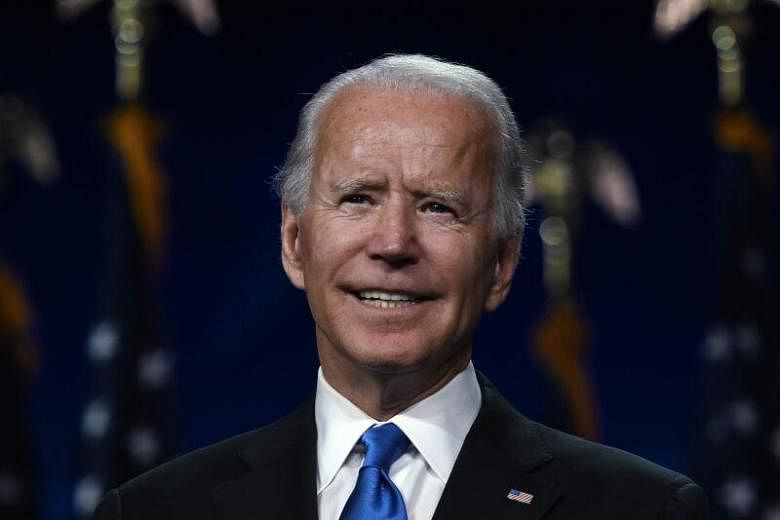WASHINGTON/LONDON (REUTERS) - When Mr Donald Trump was elected United States President in 2016, almost immediately, and with evident relish, he set about trying to demolish his predecessor Barack Obama's carefully crafted foreign policy legacy.
In the following days, months and years, Mr Trump threw out a trade deal with the Asia-Pacific, a global climate accord, a nuclear agreement with Iran and a process to end decades of hostility with Cuba.
The Republican leader also publicly attacked long-time US allies from Berlin to Tokyo while praising authoritarian rulers from Russia's Vladimir Putin to North Korea's Kim Jong Un.
And after heaping praise on China's Xi Jinping, he launched trade and rhetorical battles with Beijing that have sparked fears of a new Cold War - or even military conflict.
Top former diplomats from around the world say Mr Trump has severely damaged faith in US leadership and a Joe Biden victory in the Nov 3 presidential election would bring even bigger sighs of relief in many capitals than those when Mr George W. Bush's presidency ended more than a decade ago.
They expect quick action by a Democratic administration to restore signature Obama-era policies, starting with the climate accord.
But despite the widespread ill-feeling Mr Trump has provoked, not all his policy legacy will be hurled out of the window, and neither long-term allies nor strategic rivals expect a soft touch from Mr Biden, vice-president under Mr Obama and a former senator with decades of foreign policy experience.
They also do not expect much change from the inward-looking tendency embodied by Mr Trump's "America first" approach.
"We are really in a period of transition of defining a new American policy in power politics, with China, with Russia... so it's a new world," said Mr Gerard Araud, France's former ambassador to Washington.
"American presidents will be more committed to the national interest of the US. The US doesn't want to be the policeman of the world any more; I think Obama and Trump understood that."
TRUMP'S CHALLENGE TO CHINA
While the Trump administration has provoked some alarm with the tone of its recent attacks on China on issues ranging from the coronavirus to espionage, there is broad agreement little will change in substance under a Biden government when it comes to policy towards Beijing.
Indeed, while Mr Trump has sought to portray both Mr Obama and Mr Biden as "soft" on China, the previous administration pursued a tougher line against Beijing than Mr Trump did initially.
"In the last two years of Obama, they had a new China strategy," said Dr Michael Pillsbury, a former US defence official and China analyst who has worked as an outside adviser to Mr Trump.
"Many people think this was a Trump invention; it's not."
He noted that Biden advisers Ely Ratner, Kurt Campbell, Brian McKeon, Tony Blinken, Bob Work and Ash Carter had produced tough analyses on China and shared deep concerns about its military build-up, espionage activities and trade practices.
Mr Peter Ricketts, a national security adviser to former British prime minister David Cameron, had some praise for Mr Trump's China approach, but also a warning.
"The Trump administration crystallised a growing concern about China's activities, including its much more assertive foreign policy and its crackdown at home."
"Trump's willingness to come forward and challenge that, to call China out, that's been positive. The risk is that it could now go too far and pitch into an all-out Cold War with China."
Professor Tom Fletcher, a foreign-policy adviser to three past British prime ministers, said he did not expect big changes on China under a Biden administration, but a less abrasive style.
"I don't think the Biden policy will be a million miles away from the Trump China policy. But the language will be different, and there will be more wisdom and strategy behind it," he said.
Some analysts say Mr Trump's unprecedented but still unsuccessful engagement with North Korea could offer a future building block.
Mr Biden has called Mr Trump's personal diplomacy a "vanity project" that should only happen with a strategy to move North Korean denuclearisation forward.
HIT TO AMERICAN CREDIBILITY
Mr David O'Sullivan, the former EU ambassador to Washington, said Mr Trump had a "hugely damaging effect" and it would take time to rebuild America's image and leadership role.
But he had articulated some deeply felt concerns among Americans about the extent of US overseas involvements and a feeling that some allies were not pulling their weight.
"There will be no tears shed in Europe if Trump loses the election," Mr O'Sullivan said.
"This administration has been particularly inept, and particularly maladroit and, frankly has tended to alienate allies and give comfort to people who previously have been considered adversaries."
"Equally, I don't think anyone is under the illusion that a Biden administration will herald a kind of golden era of European-US cooperation... The differences will remain, but we will start from a point of mutual respect."
Mr O'Sullivan and others said Mr Biden would likely seek to revive the Iran agreement and Asia trade deal, but not without revisions to secure the sort of "better deal" Mr Trump often talks about getting.
While relations can be patched up, experts said scars will remain from Mr Trump's abrasive approach that could affect the willingness of countries to stick their necks out to follow American leads.
"The fundamental faith in American constancy has been shaken," said Mr Adam Ereli, a State Department spokesman under Mr Bush and an ambassador to Bahrain under Mr Obama.
"In the back of their minds will be, 'Could Trump happen again?'"

